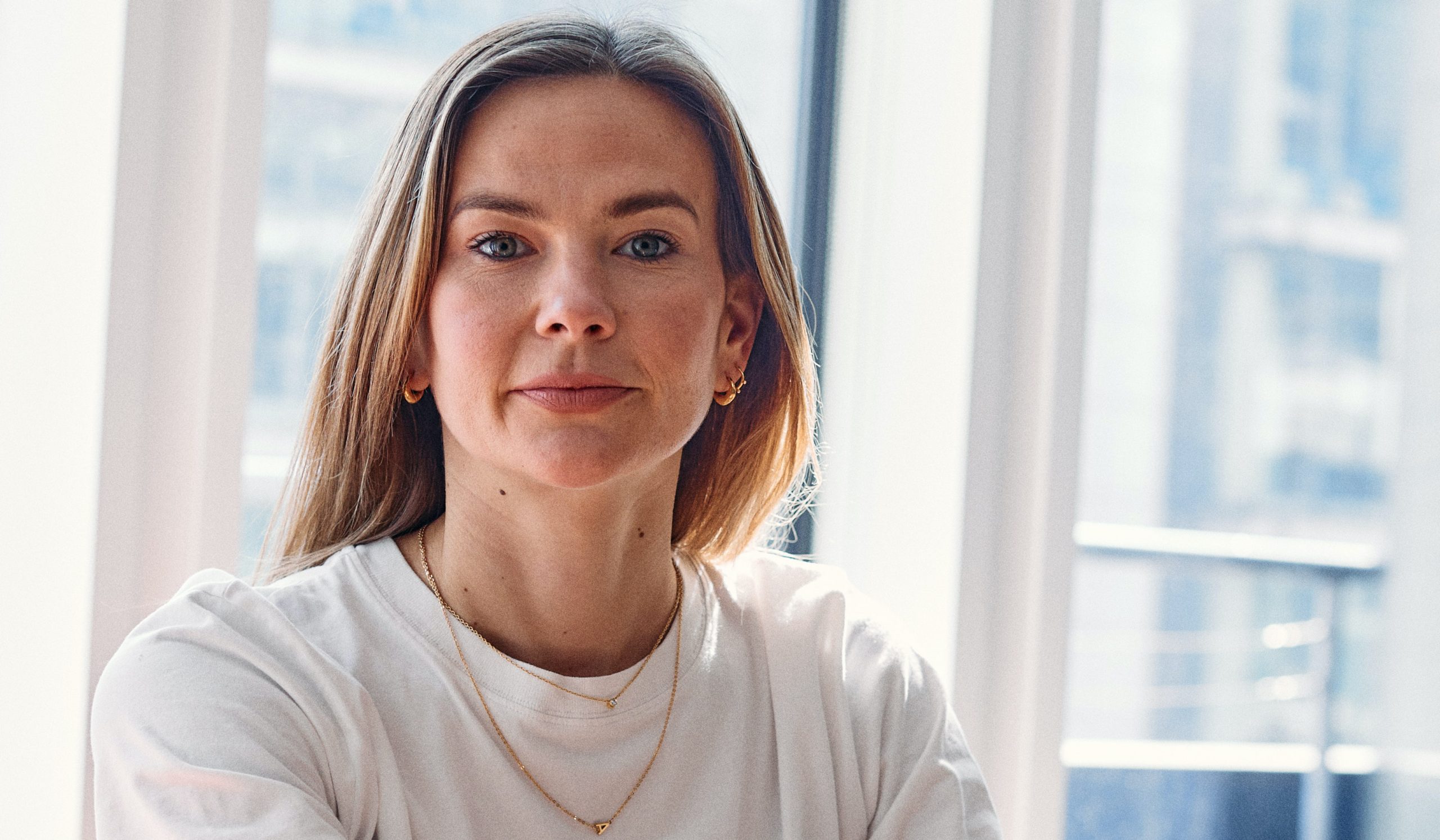Amy Golding is the CEO of Opus Talent Solutions, which solves global problems with talented people. It works in the future-focused markets of digital, renewable energy and sustainability to try and help companies build their future workforce in sectors that are cripplingly short of people with the right skills – and that our economy and planet desperately need. Opus Talent Solutions works at the most senior level, all the way down to helping people get into these exciting industries with the right training and work experience.
Amy took the CEO role at 31 when she was told she was the youngest female in the UK running a business with over $100 million in revenue. We hear more about her story.
Tell us your story.
My story has a very shaky structure and plot. When people ask me about my business journey, I find it difficult to retrace my steps – I’m not sure, given 100 goes, I would end up in the same position again.
I was always drawn to work. Throughout school and university, I was constantly coming up with ways and schemes to earn money. I just loved working and did everything from hairdressing, to waitressing, to car washing, to bar work, to office temping. I even applied to be a milkman at one point because I figured I could fit more hours of earning into my day!
I liked earning money, and I like adventures. I liked the freedom that having my own money brought and I would regularly disappear looking for the next adventure or opportunity to learn. I worked and travelled around Australia at the age of 18, went Interrailing alone, went to Spain to study Spanish (I was terrible), I worked as a journalist in China and tried to learn Chinese (I was terrible), I trained as a yoga instructor in Bali (slightly less terrible).
I also did some very sensible things that made my parents proud – I somehow got into Cambridge University to study English and worked very sensibly as a Strategy Consultant at Deloitte for four years, which really became the foundation of my business training.
I really had no idea what I wanted to do and why. I just knew that I wanted to do something that meant something. I was happy to work hard, I loved people, and when I put my mind to something, I can usually make it happen.
What brought you to founding _nology?
I had been running Opus for a couple of years and two things became very apparent. Firstly, as an English graduate and die-hard maths class dodger at school, I realised I’d bought into the rhetoric that tech was terrifying and only for people who really liked science and hoodies. I remember going to my first client meeting at a tech startup and being asked to remove my shoes at the door. I took off my brand new Louboutins (the most expensive thing I’d ever bought myself) and left them by the door in a pile of smelly size 11 Converse, and just thought: “I don’t think this is going to work”.
What I came to discover from being immersed in that world was that tech isn’t an“other”. It’s just a skill that allows you to dive deeply into any sector you’re passionate about. Whether that’s science… fashion… finance… healthcare or anything at all. Tech is a way to truly understand how that industry works, how the customers think, and how to improve it and make it more sustainable. Tech roles are creative, about design, innovation, problem-solving, building things, testing things, selling things, continuously improving things. Not only are so many people missing out on this great career path because they have no idea they are suitable, but also companies were missing out on brilliant talent with different ways of thinking.
The other thing – but totally connected - was that demand was far outstripping supply. We just couldn’t keep up with client demand. And not only did they want people, but they also wanted great people, and they wanted diverse people.
Now in tech, the people didn’t exist at all. And diversity – forget it! This was a talent pool that was 85% white, 85% male and predominantly STEM degree educated.
All of this combined into a perfect storm. People who could have been incredible were being shut off from future-proof careers. Companies were going backwards in their hard-fought diversity goals to secure the tech skills they desperately needed, and the rest of us were forever destined to use products and websites and apps and machines that had been designed and created largely by a 15% sliver of society. And I wonder why Alexa only listens to my husband.
I realised that whilst we were helping clients find great people, we weren’t creating real change. You take an incredible female developer out of one company and put her in another, you’ve helped the second company tick a box – but nothing’s advanced and nothing’s changed. You’ve just moved the problem around.
The only answer was to widen the pool, increase the pool, and add diversity to the pool. So we launched _nology.
Tell us more about what you do with _nology?
_nology is a tech assessment and training company, with a strong focus on diversity. We’ve harnessed our 15 years of knowledge. Not just about what good tech is, but what makes a great tech employee. We take people on a two-year journey with us that sees them coming out the end with an incredible role in tech and bundles of relevant real-world experience.
We’ve developed a unique assessment process where we never have to look at someone’s CV. We assess their potential and aptitude to be good at tech. We then take them through an immersive 12-week training programme that assumes zero previous coding knowledge.
We then place them on-site with the 1,000+ clients we work with through our senior talent relationships and support them in the background throughout, ensuring they get the extra support and training they need to be an indispensable member of the team. We work with some incredible clients. Companies who really understand the need to invest in creating talent not just fishing from an increasingly competitive pool. Clients like Accenture, Goldman Sachs, EY, Woolworths, Deutsche Bank and many more.
And the most important part is that our students are paid for this experience – rather than having to pay £50k in fees and living costs for a university course that may or may not be relevant and may or may not land them a job. This stat is hard-to-believe, but despite the desperate need for tech talent, in the UK, Computer Science graduates have the highest rate of unemployment of all graduates. And in the USA, unemployment of Computer Science graduates is increasing as a percentage. Tech is something that is very practical, and very much about keeping up-to-date and learning on the job. It’s a hard thing to take an academic degree straight into the workplace.
Conversely, 98% of our students (most of whom have no tech background at all) end up working full-time in tech. And once they convert full-time into our client at the end of the two-year training period, average tech salaries are over 40% higher than average UK earnings.
What are you doing to support more women and people from different backgrounds in the world of tech, which is a predominantly male-dominated field?
It all starts with the marketing. We have to reach people who don’t know they are looking for us, which is the whole point. We are careful with our use of language, removing jargon, appealing to people from different backgrounds and encouraging them to step outside their comfort zone.
We don’t use CVs – previous experience doesn’t matter to us. There is so much unconscious bias that happens in the process of reading a CV. Even if you can overlook a lack of tech experience, people tend to have a view of what “good” looks like based on their own experiences. And things like team sports, captainships, business internships, school societies, higher education, and so on, all come with hidden implications about class, gender and race that we don’t even realise aren’t ubiquitous if you come from that world.
This year, 48% of our students have been female and 63% have been from ethnic minorities. And that’s just the starting point. 72% are career changers, meaning they aren’t fresh graduates, they come with a wealth of other experience. And 33% don’t have a degree at all.
One of my proudest moments was when we placed a young woman from our course into a global investment bank. It was the first time they’d taken someone onto one of their prestigious programmes who didn’t have a degree, and she went on to get an early promotion. These companies are desperate to think outside the box and stop stereotyping, but they also can’t risk compromising on quality and if you take away the standard screening mechanisms that have been used for decades, it’s very hard to make sure you’re getting it right.
We are giving people a route into a career that can change the course of their, and their family’s lives. And the confidence and support to flourish in potentially intimidating corporate environments.
That’s where we can really help people. Our people are absolute top quality. We just don’t have to define “quality” by whether they could afford to go to university or abandon care duties, as an example. Another example is an incredible woman who’s got four kids and has had a long career break. She didn’t have a degree and didn’t know where to begin in trying to get back into the workforce. Not only is she one of the technically strongest people we’ve had on the course – she’s now got a prestigious placement at a large consultancy that would traditionally hire graduates with tech experience.
We are giving people a route into a career that can change the course of their, and their family’s lives. And the confidence and support to flourish in potentially intimidating corporate environments.
We’ve just signed a really exciting partnership with The Prince’s Trust to take on students who are part of their charitable communities. From October, we will be running dedicated courses for Prince’s Trust alumni with extra pastoral support and additional training around business skills to ensure they get the best experience and the best chance of success.
What is your ultimate goal for _nology?
We’ve only been going a couple of years, but we are really proud to say that we’ve added over 600 people into the tech community who probably wouldn’t have been there otherwise.
People always talk about sustainability. Our aim is to become “talent neutral” as a business. We currently place over 4,000 people a year into roles in these great sectors. My ultimate aim is to bring as many new people into the field as we are placing senior people.
I want to try and make the tech landscape represent the community it serves in fair proportions. It’s not about convincing more girls they must take STEM and move towards the perceived “tech profile”. It’s about widening the tech profile to include all types of people. Although having said that, since COVID and becoming a mum, I basically only ever wear Converse now too.











